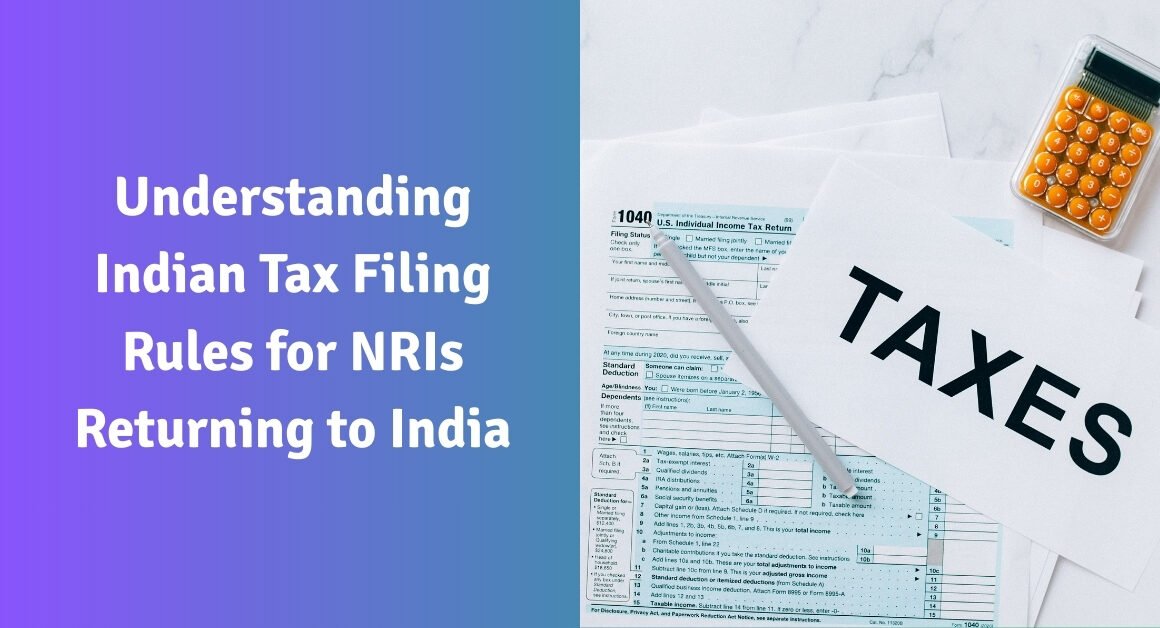How to Plan for Your Post-Retirement Life in India After Returning?
For countless Non-Resident Indians (NRIs), contemplating a return to India after decades abroad evokes complex emotions nostalgia, anticipation, and understandable apprehension about such a monumental life transition. While career advancement or family obligations may have initially led them overseas, retirement often rekindles the powerful desire to reconnect with familiar cultural roots and homeland comfort. However, post-retirement life in India, like any significant life transformation, demands comprehensive planning across financial, emotional, and practical dimensions. The India of today offers returning NRIs unprecedented opportunities for comfortable, secure, and fulfilling retirement experiences, provided they approach this transition with proper preparation and realistic expectations. India’s Evolving Retirement Landscape Modern retirement in India has transcended traditional notions of quiet, inactive golden years. Today’s India presents a dynamic environment where urban centers thrive, healthcare facilities achieve international standards, and innovative financial instruments cater specifically to retiree needs. This transformation enables returning NRIs to design retirement lifestyles that blend familiar cultural comfort with contemporary conveniences and global-quality services. The emergence of senior living communities, comprehensive insurance products, specialized wealth management services for NRIs, and retirement-friendly tax policies contributes to a sophisticated retirement ecosystem. This evolution means you can plan for retirement that’s simultaneously rooted in cultural familiarity and equipped with modern comforts and security features. Furthermore, India’s growing focus on elderly care, digital financial services, and healthcare innovation creates an environment where international returnees can maintain high living standards while enjoying significantly lower costs compared to many developed countries. Strategic Location Selection and Lifestyle Design Your chosen retirement location fundamentally influences your quality of life, access to essential services, and overall satisfaction with your India return. This decision requires careful evaluation of multiple factors that directly impact daily living and long-term well-being. Many NRIs instinctively consider returning to ancestral homes or birth cities to strengthen family connections and honor emotional ties. Others gravitate toward metropolitan areas like Bengaluru, Pune, Hyderabad, or Gurgaon for their superior healthcare infrastructure, international connectivity, and established NRI communities that ease social transitions. Alternatively, peaceful destinations such as Coimbatore, Mysore, Dehradun, or Goa offer relaxed living environments with lower costs, cleaner air, and slower-paced lifestyles ideal for those seeking tranquil retirement experiences. Critical evaluation factors include proximity to quality healthcare facilities, airport accessibility for travel, personal safety and security, lifestyle preferences between urban convenience and semi-urban tranquility, and access to essential services like banking, shopping, and emergency services. For active retirees, consider proximity to cultural centers, recreational clubs, volunteer organizations, educational institutions, and social groups that align with your interests and values. Comprehensive Financial Management and Investment Strategy Financial management represents the most crucial aspect of successful retirement transition. Begin by systematically converting NRI-specific banking relationships typically NRE (Non-Resident External) and NRO (Non-Resident Ordinary) accounts into appropriate resident accounts or Resident Foreign Currency (RFC) accounts once your residency status changes. Carefully evaluate foreign assets and their alignment with Indian taxation requirements. Strategic decisions about fund repatriation versus maintaining overseas investments depend on future travel plans, family needs abroad, currency diversification goals, and tax optimization opportunities. Post-Retirement Income Optimization: Senior Citizen Savings Scheme (SCSS): Government-backed scheme offering attractive interest rates higher than conventional fixed deposits, with quarterly interest payments ideal for regular income needs. Post Office Monthly Income Scheme (POMIS): Provides steady monthly income with government security, particularly suitable for conservative investors seeking predictable cash flows. Debt-Oriented Mutual Funds: Offer professional management with moderate risk and better returns than traditional fixed deposits, providing flexibility and liquidity. Systematic Withdrawal Plans (SWP): Enable regular income from mutual fund investments while potentially maintaining capital through growth. Rental Income Strategies: Well-located property investments can provide substantial monthly income while appreciating over time. Engaging qualified financial advisors with demonstrated NRI expertise ensures optimal asset allocation while maintaining compliance with evolving regulatory requirements. Taxation Navigation and Compliance Management Achieving resident status fundamentally transforms your tax obligations, potentially subjecting worldwide income to Indian taxation. Understanding residential status determination criteria and transition rules becomes essential for effective tax planning and compliance. Double Taxation Avoidance Agreements (DTAA) between India and your previous country of residence prevent taxation of the same income in both jurisdictions. Proper DTAA utilization can significantly reduce overall tax liability while ensuring legal compliance. Key Tax Advantages for Retirees: Senior citizens (60+) enjoy higher income tax exemption limits, currently ₹3,00,000 annually compared to ₹2,50,000 for younger individuals. Super senior citizens (80+) receive even higher exemptions of ₹5,00,000. Health insurance premium deductions under Section 80D allow additional deductions up to ₹50,000 for senior citizens, providing substantial tax savings while encouraging adequate healthcare coverage. No advance tax requirements for senior citizens simplify compliance procedures and reduce administrative burdens. Strategic tax planning involves optimizing deductions, choosing appropriate tax regimes, and timing income recognition to minimize overall liability while maintaining full compliance. Healthcare Infrastructure and Insurance Strategy Quality healthcare access represents a non-negotiable requirement for retirement security. India’s healthcare landscape has experienced remarkable transformation, particularly in tier-1 and tier-2 cities, with many hospitals achieving international accreditation standards and specializing in geriatric care. Research hospitals with international quality certifications, geriatric specialization, emergency services availability, and proximity to your chosen residence. Many Indian hospitals now offer comprehensive elderly care programs, preventive health packages, and chronic disease management services specifically designed for senior citizens. Comprehensive Health Insurance Strategy: International health plans may not provide adequate Indian coverage or may become prohibitively expensive for elderly individuals. Securing comprehensive Indian health insurance immediately upon return, while you’re relatively younger and healthier, ensures better coverage terms and lower premiums. Essential coverage features include lifetime renewability guarantees, comprehensive critical illness protection, substantial no-claim bonus accumulation, extensive cashless network hospitals for convenient treatment access, and coverage for pre-existing conditions after waiting periods. Consider supplementing basic health insurance with specialized policies for specific conditions common among elderly individuals, such as diabetes, hypertension, or cardiac issues. Many Indian insurers now offer senior citizen-specific policies designed to address age-related health concerns comprehensively. Preventive Healthcare Investment: India’s growing focus on preventive medicine and wellness programs provides excellent opportunities for maintaining health and reducing long-term medical
Understanding Indian Inheritance and Succession Laws for Returning NRIs
Imagine receiving a call from India about a property you never knew existed your grandfather’s ancestral home that’s been sitting in legal limbo for decades. Or discovering that your family’s traditional business has shares registered in your name. Welcome to the complex, often surprising world of Indian inheritance and succession laws that every returning NRI must navigate. Inheritance in India isn’t just about money and property it’s about family history, religious traditions, and legal frameworks that can seem bewildering to those accustomed to Western legal systems. But here’s the good news: understanding these laws can unlock significant wealth and provide clarity for your own estate planning. The Great Divide: Two Paths to Inheritance Indian succession law operates like a railway junction with two distinct tracks. Your journey depends entirely on whether the deceased left behind a roadmap (will) or ventured into the unknown without one. The Testamentary Express: When someone passes away leaving a valid will, the law becomes beautifully simple assets flow according to their written wishes. It’s like having GPS for your inheritance journey. The Intestate Adventure: No will? No problem but prepare for a more complex route. Here, your religious background becomes your navigation system, with different communities following entirely different rules carved from centuries of tradition and law. This religious distinction isn’t just administrative it’s fundamental. A Hindu businessman in Mumbai and a Christian entrepreneur in Kochi follow completely different inheritance rules, even if they lived identical lives. For returning NRIs, this can be eye-opening, especially when dealing with ancestral properties governed by traditional laws that may seem foreign after years abroad. The Property Puzzle: Ancestral vs. Self-Made Wealth Here’s where Indian inheritance law gets fascinating. Not all property is created equal, and understanding the difference can mean the difference between inheriting a fortune or getting nothing at all. Ancestral Property: The Family Crown Jewels Ancestral property is like a family heirloom passed down through male lineage for up to four generations without division. Every legal heir (coparcener) has a birthright imagine having shares in a family company you never knew existed. This property carries the weight of generations, and even the most detailed will cannot completely override these birthright claims. Self-Acquired Property: The Individual Kingdom Self-acquired property represents personal achievement everything earned, bought, or created through individual effort. Here, property owners reign supreme, free to bequeath their wealth to anyone they choose, from family members to charities to their favorite pet (yes, legally possible!). Many NRIs discover they’re entitled to ancestral properties in unexpected places village lands, urban plots, or family businesses they never knew about. It’s like finding hidden treasure, but with legal documentation required. When There’s No Will: Religious Laws Take the Wheel Intestate succession in India reads like a fascinating study in cultural diversity, where your religious identity determines your inheritance destiny. Hindu Succession: The Democratic Approach Under the Hindu Succession Act, inheritance follows a structured hierarchy. When a Hindu male dies intestate, property flows to Class I heirs (spouse, children, mother) equally. Recent legal amendments have revolutionized women’s rights daughters now enjoy equal inheritance rights as sons in ancestral property, overturning centuries of male-dominated inheritance patterns. Female Hindu intestate succession follows different rules, with property first flowing to husband and children, then to parental family if immediate family doesn’t survive. Muslim Personal Law: The Prescribed Portions Islamic inheritance law operates like a precise mathematical formula, with specific shares designated for different family relationships. The system limits testamentary freedom to one-third of total assets when legal heirs exist the remaining two-thirds must follow prescribed Islamic distribution rules. This system ensures family members receive their rightful shares but can surprise NRIs accustomed to complete testamentary freedom in other countries. The Documentation Marathon: Papers That Open Doors Claiming inheritance in India requires navigating a documentation obstacle course that can challenge even the most organized individuals. But each document serves as a key unlocking different aspects of your inheritance. Succession Certificate: Your Financial Passport This court-issued document grants authority to claim movable assets bank deposits, insurance proceeds, securities, and other financial instruments. Think of it as your official permission slip to access the deceased’s financial world. Legal Heir Certificate: The Family Tree Validator Local authorities issue these certificates establishing your familial relationship with the deceased. It’s like an official stamp confirming your place in the family hierarchy. Probate: The Will’s Authentication In major cities like Mumbai, Chennai, and Kolkata, wills require probate court authentication ensuring the document’s validity and the executor’s authority. It’s quality control for inheritance distribution. Mutation: The Ownership Transfer Property mutation updates official records, transferring ownership from deceased to heir. This process transforms legal entitlement into practical ownership. Essential supporting documents include Indian passports, OCI cards, NRI status proofs, relationship evidence, property documents, and death certificates. Each serves as a piece in the inheritance puzzle. The Tax Advantage: India’s Inheritance Gift Here’s delightful news for inheritance recipients: India abolished estate duty in 1985, meaning inherited assets arrive tax-free. It’s like receiving a gift from the government alongside your family legacy. However, selling inherited property later triggers capital gains tax based on holding period and indexed acquisition costs. Smart planning can minimize these obligations while maximizing inheritance value. FEMA Compliance: The Regulatory Reality Inheriting Indian property while maintaining foreign assets requires compliance with Foreign Exchange Management Act regulations and Income Tax filing requirements. It’s manageable but requires attention to regulatory details. Strategic Challenges: Distance, Disputes, and Documentation Returning NRIs face unique inheritance challenges that require creative solutions and strategic thinking. Distance Dilemmas Physical absence from India can complicate legal procedures, but Power of Attorney arrangements enable trusted representatives to act on your behalf. It’s like having a legal twin managing your interests. Family Feuds Inheritance disputes can fracture families, but early intervention, professional mediation, and clear communication often prevent costly litigation while preserving relationships. Record Keeping Maintaining comprehensive documentation of overseas residence, income sources, and tax payments supports future compliance and dispute resolution. Proactive Estate Planning: Your Legacy Blueprint Smart NRIs don’t
Understanding Indian Tax Filing Rules for NRIs Returning to India
Returning to India as a Non-Resident Indian (NRI) represents a significant life milestone that combines emotional satisfaction with complex financial considerations. Among the most critical yet frequently misunderstood aspects of this transition involves navigating India’s intricate tax filing requirements. Whether your overseas journey spanned a few years or several decades, your tax responsibilities undergo fundamental changes upon your return to Indian shores. Understanding these tax obligations comprehensively can help you circumvent costly penalties, optimize your tax efficiency, and facilitate a seamless financial reintegration into Indian society. This comprehensive guide demystifies the essential tax regulations, critical deadlines, and strategic approaches that returning NRIs must master for successful compliance. Determining Your Tax Residential Status Understanding your tax residential status forms the foundation of Indian tax compliance. The Income Tax Act establishes specific criteria based on your physical presence in India during a financial year. You qualify as a Resident Indian if you satisfy either of these conditions: Failing to meet either criterion classifies you as a Non-Resident Indian for tax purposes. Important Note: Returning NRIs typically qualify for Resident but Not Ordinarily Resident (RNOR) status for approximately two to three years, providing significant transitional tax advantages. Leveraging RNOR Status Benefits The RNOR classification serves as a crucial tax bridge during your transition period, offering substantial financial advantages that can significantly impact your tax liability. Key benefits of RNOR status include: This transitional period allows you to gradually adjust your financial structure while maintaining significant tax advantages. Understanding Taxable Income Categories Once you achieve full Resident Indian status, India’s tax net expands to encompass your worldwide income streams. This comprehensive taxation includes: As a Resident, you must declare both domestic and foreign assets while filing returns, regardless of whether the income enjoys exemption or faces taxation abroad. Non-compliance with these disclosure requirements can trigger severe penalties under India’s Black Money Act. Income Tax Return Filing Process India’s financial year operates from April 1st to March 31st, with tax return filing typically due by July 31st of the subsequent assessment year, though the government occasionally grants extensions. Essential steps for returning NRIs include: The government’s Income Tax e-filing portal facilitates online submissions, though many NRIs engage tax professionals, particularly during transition years when regulations prove most complex. Managing Double Taxation Concerns Double taxation represents a primary concern for returning NRIs who face potential tax obligations in multiple jurisdictions. India addresses this through Double Taxation Avoidance Agreements (DTAA) with over 90 countries, including major destinations like the United States, United Kingdom, Canada, and United Arab Emirates. DTAA provisions enable you to: These agreements prove particularly valuable for individuals receiving ongoing pensions, dividends, or rental income from overseas sources after establishing Indian residency. Strategic Compliance Planning Successful relocation involves comprehensive financial planning beyond simple address changes. Consider these essential strategies: Banking Transitions: Notify your banks and update Know Your Customer (KYC) documentation to convert NRE/NRO accounts to resident accounts when your status changes. Account Management: Evaluate whether to close or reclassify foreign accounts based on ongoing requirements and compliance costs. Professional Guidance: Engage certified accountants or tax advisors specializing in NRI matters, particularly during your initial return year and subsequent transition period. Documentation Systems: Maintain comprehensive records of foreign income and taxes paid abroad to support future claims and compliance requirements. Timely Filing: Submit returns promptly even without taxable income to ensure compliance and maintain clean records. Conclusion Returning to India represents a transformative life decision where understanding tax filing obligations plays a pivotal role in your financial success. From determining residential status to managing foreign income and claiming tax relief through international agreements, every decision significantly impacts your long-term financial health. The RNOR status provides temporary relief, but eventually, comprehensive Indian tax regulations will apply to your complete financial picture. Adopting a proactive approach, staying informed about regulatory changes, and consulting specialists when necessary will enable you to enjoy your Indian homecoming without tax-related complications. The ultimate objective transcends mere legal compliance it involves smart compliance that preserves your accumulated wealth while establishing effective long-term financial planning for your future in India. Frequently Asked Questions 1. Do all returning NRIs need to pay taxes in India immediately upon arrival? Ans- Tax obligations depend on your residential status determination. If you qualify as an NRI based on days spent in India, only Indian-sourced income is taxable. However, once you become a resident, global income becomes taxable. 2. How long can I maintain RNOR status after returning to India? Ans- RNOR status typically lasts 2-3 years depending on your residency history over the preceding 10 years. Those who were non-residents for 9 out of 10 preceding years can enjoy this status longer. 3. Is foreign pension income always taxable in India for residents? Ans- Yes, foreign pension income becomes taxable in India once you achieve resident status. However, DTAA provisions may provide relief from double taxation. 4. Must I convert my NRE/NRO accounts immediately upon returning? Ans- You should convert these accounts once your residential status changes from NRI to resident. Maintaining NRI accounts after becoming a resident violates FEMA regulations. 5. Can I claim deductions for taxes paid abroad on the same income? Ans- Yes, through DTAA provisions, you can claim credit for foreign taxes paid on income that’s also taxable in India, preventing double taxation. 6. Do I need to report foreign assets if I have no foreign income? Ans- Yes, residents must report all foreign assets regardless of whether they generate income, as per the Foreign Asset Disclosure requirements. 7. What happens if I fail to file returns after becoming a resident? Ans- Non-filing can result in penalties, interest charges, and potential prosecution under the Income Tax Act. It’s advisable to file even with no taxable income. 8. Can I continue investing in foreign markets after becoming an Indian resident? Ans- Yes, but you must comply with FEMA regulations regarding overseas investments and report these investments in your tax returns. 9. Is professional tax advice necessary for returning NRIs? Ans- While not mandatory,
The Advantages of Returning to India for NRIs
The decision to return to India after establishing life abroad represents a significant transition influenced by emotional connections, professional opportunities, and long-term planning considerations. While relocating back home may initially seem daunting, the advantages of returning to India are increasingly compelling and often underestimated. From reconnecting with cultural heritage and family bonds to exploring professional growth in a rapidly expanding economy, coming home offers rewards that extend far beyond simple geography. This exploration examines the multifaceted benefits of returning to India as an NRI, covering emotional fulfillment, professional opportunities, financial advantages, and lifestyle improvements to help inform confident, future-ready decisions. Emotional Reconnection and Cultural Heritage The emotional pull of family proximity and cultural immersion represents one of the most compelling reasons for NRI repatriation. Years of separation from aging parents, childhood friendships, and deep-rooted traditions often create emotional voids that technology cannot adequately fill. Returning enables participation in family milestones, daily interactions, and cultural celebrations that define personal identity and belonging. Family Relationship Benefits: Being present for parents’ aging years, children’s growth milestones, extended family gatherings, and community celebrations provides irreplaceable emotional satisfaction. The ability to provide immediate support during health emergencies, family crises, or significant life events strengthens family bonds and personal fulfillment. Cultural Identity Development: Children of NRIs often struggle with cultural identity when raised abroad. Returning to India provides firsthand exposure to Indian traditions, languages, festivals, and social values, helping them develop strong cultural foundations while maintaining global perspectives gained abroad. Community Integration: Rebuilding connections with school friends, college networks, and local communities provides social support systems that enhance quality of life and personal satisfaction beyond professional achievements. Professional Growth in Dynamic Economy India has emerged as one of the world’s fastest-growing major economies, creating expanding opportunities across multiple sectors including technology, healthcare, financial services, education, and infrastructure development. Many NRIs return with specialized global experience and advanced skills that are highly valued in Indian markets. Reverse Brain Drain Phenomenon: Significant numbers of Indian-origin professionals now choose to lead businesses, start ventures, or contribute to government and policy sectors in India rather than continuing abroad. This trend reflects growing confidence in India’s economic prospects and professional opportunities. Entrepreneurial Ecosystem: India’s startup environment rivals global innovation hubs, offering venture capital access, government incentives, accelerator programs, and support systems for entrepreneurs. The large domestic market, increasing digital adoption, and supportive regulatory frameworks create fertile ground for business ventures. Leadership Opportunities: Many multinational companies now base regional headquarters or significant operations in India, creating senior leadership positions that leverage international experience while offering career advancement opportunities unavailable abroad. Skill Premium: Global experience, international education, and cross-cultural competency command premium compensation and rapid career progression in India’s competitive talent market. Financial Benefits and Economic Advantages Returning to India often provides significant financial benefits through lower living costs, favorable exchange rates, and strategic investment opportunities available to returning residents. Cost of Living Advantages: Depending on your previous residence abroad, India generally offers substantially lower costs for housing, domestic services, healthcare, dining, and entertainment. Foreign currency savings can provide significantly enhanced lifestyle standards in India compared to equivalent expenditure abroad. Purchasing Power Enhancement: Your accumulated foreign currency wealth translated to Indian rupees often provides substantial purchasing power improvements, enabling comfortable retirement, property investment, or business venture funding that might be unaffordable in expensive foreign markets. Investment Opportunities: Returning residents can access Indian investment products including tax-efficient instruments, real estate markets, government securities, and equity markets that may offer superior risk-adjusted returns compared to low-yield foreign markets. Tax Optimization: Strategic planning around residential status changes, RNOR (Resident but Not Ordinarily Resident) benefits, and tax-efficient investment structuring can significantly enhance overall financial outcomes. Quality Healthcare and Education Access India’s private healthcare and education sectors have advanced dramatically, offering world-class services at substantially lower costs than many developed countries. Healthcare Excellence: Major Indian cities host internationally accredited hospitals with leading specialists, advanced medical technology, and comprehensive treatment options. Healthcare costs remain significantly lower than Western countries while maintaining high quality standards. Educational Options: India’s education landscape includes top-tier international schools, prestigious CBSE/ICSE institutions, and foreign university campuses offering global curriculum options. Higher education opportunities span traditional universities to specialized institutions with international collaborations. Preventive and Wellness Focus: Traditional Indian healthcare systems including Ayurveda, yoga, and holistic wellness approaches provide comprehensive health maintenance options often unavailable or expensive abroad. Lifestyle Balance and Community Living Many tier-1 and tier-2 Indian cities now offer sophisticated urban amenities while maintaining community-oriented social structures that many NRIs miss during their time abroad. Work-Life Balance: Despite India’s dynamic business environment, many locations offer more balanced lifestyles with shorter commutes, domestic help availability, extended family support, and rich social calendars that enhance personal satisfaction. Community Support Systems: Indian social structures provide robust community networks, neighborhood relationships, and extended family support that can significantly improve quality of life, especially for families with children or aging considerations. Cultural Richness: Daily exposure to diverse languages, arts, festivals, cuisine, and traditions provides cultural richness often missing in homogeneous foreign communities. Professional Flexibility: India’s diverse economy offers multiple career path options, consulting opportunities, and entrepreneurial ventures that provide professional satisfaction and financial success. Economic and Social Infrastructure Development India’s rapid infrastructure development, digital transformation, and economic modernization create exciting opportunities for returning NRIs to contribute to national progress while building personal success. Digital Infrastructure: India’s digital payment systems, e-governance initiatives, and technology adoption rates often exceed those in developed countries, providing efficient and convenient daily life management. Transportation Networks: Expanding metro systems, improved road networks, high-speed rail projects, and enhanced air connectivity dramatically improve mobility and quality of life in major cities. Real Estate Opportunities: Property markets in growing cities offer both investment opportunities and lifestyle improvements, with modern residential complexes providing international standard amenities. Conclusion Returning to India represents moving forward rather than stepping backward. As India continues evolving with increased stability, sophistication, and opportunity, NRIs have compelling reasons for considering long-term repatriation. From family reunification and meaningful professional contribution to cost-effective living and purposeful retirement
How to Make Your Relocation to India Efficient and Stress-Free?
Returning to India after years abroad represents both exciting opportunity and complex challenge for NRIs. From financial asset management and lifestyle adjustments to documentation requirements and emotional transitions, repatriation involves multiple interconnected layers requiring careful coordination. However, with proper planning and systematic preparation, you can transform your relocation into a smooth, efficient, and rewarding experience that positions you for success in your homeland. This comprehensive guide provides essential steps and strategies to ensure your transition back to India proceeds seamlessly while maximizing opportunities and minimizing potential complications. Strategic Planning Foundation Successful relocations begin with comprehensive planning well before departure. Ideally, start preparing 12-18 months before your planned return date, treating the process as a major life project requiring systematic management and careful execution. Planning Phase Components: Comprehensive Checklist Development: Create detailed lists covering financial transitions, housing arrangements, taxation compliance, healthcare setup, children’s education planning, and legal documentation requirements. Market Research and Networking: Connect with local contacts, friends, and family members in India to understand current market conditions, lifestyle costs, regulatory changes, and practical considerations. Social media groups and professional networks provide valuable insights from recent returnees. Preliminary Visits: Consider exploratory trips to potential destination cities before final relocation. These visits help assess living conditions, evaluate neighborhood options, understand infrastructure quality, and make informed decisions about your future base location. Financial Planning and Asset Management Financial preparation forms the cornerstone of successful repatriation, requiring careful attention to regulatory compliance, tax implications, and strategic asset positioning. Bank Account Management: Under FEMA and Income Tax Act provisions, your residential status change requires systematic account reclassification. NRE (Non-Resident External), NRO (Non-Resident Ordinary), and FCNR (Foreign Currency Non-Resident) accounts must be converted to resident accounts or RFC (Resident Foreign Currency) accounts within reasonable timeframes. Investment Portfolio Restructuring: NRIs often maintain investments in foreign mutual funds, stocks, or retirement accounts that may face tax efficiency challenges upon return. Assess your global portfolio for Indian tax implications, considering factors like dividend taxation, capital gains treatment, and ongoing compliance requirements. Tax Status Transition: Once you become an Indian tax resident (spending 182+ days annually in India), global income becomes taxable in India. Plan this transition carefully, considering timing of income recognition, available tax credits under Double Taxation Avoidance Agreements, and optimization strategies for overall tax efficiency. Currency and Remittance Planning: Strategic timing of fund transfers can optimize exchange rates and minimize transaction costs. Consider systematic transfer plans to average out currency fluctuations while ensuring adequate funds for immediate settlement needs. Housing and Accommodation Strategy Housing decisions significantly impact your quality of life and financial well-being, requiring careful evaluation of various options and long-term considerations. Property Assessment for Existing Owners: If you own property in India, conduct thorough condition assessments and necessary renovations before arrival. Consider factors like structural integrity, modern amenity availability, security features, and neighborhood development trends. Rental Market Analysis: For those planning to rent initially, research rental markets in target cities, understanding price ranges, lease terms, security deposit requirements, and tenant rights. Online platforms provide extensive property listings and market trend information. Purchase Planning: Property purchase decisions should consider proximity to quality schools (if applicable), healthcare facilities, employment centers, transportation connectivity, and future development plans. Engage local real estate professionals familiar with NRI requirements and preferences. Location Selection: Decide whether to settle near extended family for emotional support or in cities offering better professional opportunities, infrastructure, and lifestyle amenities. Consider long-term implications of location choices on career prospects, children’s education, and quality of life. Legal Documentation and Compliance Systematic handling of legal and documentation requirements prevents delays and complications during your transition period. Identity Document Updates: Banking and Financial Compliance: Customs and Import Procedures: For high-value items like gold jewelry, electronics, vehicles, or household goods, understand customs regulations, duty structures, and declaration requirements. Proper documentation and advance planning prevent delays and penalty issues at ports of entry. Healthcare and Insurance Planning Healthcare transition requires advance planning to ensure continuous coverage and access to quality medical services upon arrival. Health Insurance Evaluation: Review existing international health coverage for India applicability. Many global policies offer limited coverage in India or exclude certain treatments, making supplementary coverage necessary. Domestic Health Insurance: Research Indian health insurance options considering factors like network hospitals, coverage limits, pre-existing condition waiting periods, and premium structures. Family floater policies often provide cost-effective coverage for families with children. Medical Records Management: Compile comprehensive medical records, prescription histories, and specialist reports for continuity of care. Digital record-keeping ensures accessibility and prevents treatment delays. Preventive Healthcare: Schedule comprehensive health checkups before departure and upon arrival to establish baseline health status and identify any immediate medical attention requirements. Cultural and Emotional Preparation Returning to India involves significant cultural and emotional adjustments requiring mental preparation and realistic expectation setting. Reverse Culture Shock Management: After years abroad, India’s pace, bureaucratic procedures, traffic conditions, and social dynamics may feel overwhelming initially. Mental preparation and gradual adjustment expectations help manage this transition effectively. Children’s Adjustment Planning: If relocating with children, prepare them for educational system changes, cultural differences, social environment shifts, and new routine establishment. International or IB curriculum schools can ease academic transitions for children educated abroad. Social Integration Strategies: Rebuild social networks through professional associations, community groups, hobby clubs, and neighborhood interactions. Active social engagement accelerates adjustment and provides valuable local insights. Professional Network Development: Leverage your international experience and skills while building local professional relationships. Industry associations, alumni networks, and professional meetups facilitate career development and business opportunity identification. Conclusion Returning to India as an NRI can be profoundly fulfilling when properly managed. Success requires systematic planning, comprehensive preparation, realistic expectation setting, and professional guidance when needed. By organizing finances effectively, understanding legal requirements, securing appropriate housing, and preparing emotionally for cultural transitions, you can transform your relocation into a smooth and enriching life experience. Remember that India continues evolving rapidly, offering numerous opportunities for your global experience and expertise to contribute meaningfully whi FAQs Disclaimer: The information provided here is for educational and informational purposes only and should
How to Build a Future-Proof Retirement Plan in India as an NRI?
The airport announcement echoes through the terminal: “Flight AI 131 to Mumbai is now boarding.” As you clutch your one-way ticket back to India, decades of memories flash before your eyes climbing corporate ladders in foreign cities, building wealth in distant lands, and always carrying that small ache of homesickness. Now, at the threshold of retirement, you’re finally coming home. But are you prepared for what awaits? Post-retirement life in India isn’t just about returning to your roots it’s about reimagining what your golden years can look like in a country that’s transforming faster than you ever imagined. This isn’t the India you left behind; this is a nation where senior citizens are rediscovering the art of living well. India’s Retirement Revolution: Your Timing is Perfect Forget everything you think you know about retirement in India. The old stereotype of elderly people sitting quietly in corners, forgotten by progress, is as outdated as dial-up internet. Today’s India offers a retirement experience that would make many Western countries envious. Modern India pulses with energy urban centers buzz with activity, healthcare facilities rival international standards, and financial services cater specifically to sophisticated retirees like you. Senior living communities, specialized wealth management services, and retirement-friendly policies create an ecosystem where your international experience meets Indian comfort. This transformation means you can design a retirement that honors your cultural roots while maintaining the lifestyle standards you’ve grown accustomed to abroad. It’s the best of both worlds, wrapped in familiar flavors and languages. The Great Location Game: Where Will You Write Your Next Chapter? Choosing your retirement destination in India is like selecting the perfect wine the right choice enhances everything else. This decision will influence your daily happiness, health outcomes, and overall retirement satisfaction for decades to come. The Hometown Heroes Many NRIs feel the magnetic pull of ancestral homes, where family memories live in every corner and childhood friends welcome you with open arms. Returning to your roots offers emotional fulfillment and often significantly lower living costs, but consider whether aging infrastructure and limited healthcare options align with your needs. The Metro Mavericks Cities like Bengaluru, Pune, and Hyderabad have become retirement magnets for good reason. They offer world-class hospitals, vibrant NRI communities, excellent connectivity, and cultural activities that keep life interesting. Yes, costs are higher, but so are the amenities and quality of life. The Peaceful Pioneers Then there are India’s hidden retirement gems Coimbatore’s perfect weather, Dehradun’s mountain serenity, Goa’s beach lifestyle, or Mysore’s cultural richness. These destinations offer the sweet spot between modern amenities and peaceful living, often at surprisingly affordable costs. Consider proximity to quality healthcare, airport access for travel, safety and security, climate preferences, and availability of services you consider essential. If you’re planning an active retirement, factor in cultural centers, recreational facilities, and volunteer opportunities. Organizing Your Money for Maximum Happiness The most crucial aspect of your retirement transition isn’t emotional it’s financial. Get this right, and everything else falls into place. Get it wrong, and even the most beautiful retirement location can become a source of stress. The Great Account Migration Your first mission: transition those NRE and NRO accounts that served you well abroad into resident accounts or RFC (Resident Foreign Currency) accounts. This isn’t just paperwork it’s unlocking access to better investment options and ensuring regulatory compliance. Foreign Asset Feng Shui Evaluate your overseas wealth strategically. Should you repatriate everything immediately, or maintain some foreign investments for currency diversification? Consider future travel plans, family needs abroad, and tax implications. There’s no one-size-fits-all answer your decision should align with your unique circumstances. Income Stream Engineering Smart retirees don’t just live off savings they create multiple income streams: The Tax Tango: Dancing with Indian Revenue Laws Becoming an Indian resident transforms your tax universe. Suddenly, your global income becomes India’s business, and understanding these changes can save you lakhs annually while ensuring full compliance. DTAA: Your Double Taxation Shield Double Taxation Avoidance Agreements between India and your previous country of residence can be your financial lifesaver. These treaties prevent the same income from being taxed twice, but leveraging them effectively requires understanding the fine print. Senior Citizen Superpowers Age brings wisdom and tax benefits! Senior citizens (60+) enjoy higher exemption limits, currently ₹3,00,000 versus ₹2,50,000 for younger taxpayers. Super senior citizens (80+) get even better treatment with ₹5,00,000 exemptions. Health insurance premiums under Section 80D offer additional deductions up to ₹50,000 for senior citizens. No advance tax requirements simplify your compliance burden. These benefits can translate to substantial annual savings. Healthcare: Your Most Important Retirement Investment Healthcare in retirement isn’t just about treating illness it’s about maintaining vitality, independence, and quality of life. India’s healthcare transformation offers excellent opportunities, but only if you plan strategically. The Insurance Imperative International health plans often become prohibitively expensive or provide inadequate Indian coverage. Securing comprehensive Indian health insurance immediately upon return while you’re relatively younger and healthier ensures better terms and coverage. Look for policies with lifetime renewability, comprehensive critical illness coverage, substantial no-claim bonuses, extensive cashless hospital networks, and reasonable waiting periods for pre-existing conditions. Preventive Care Revolution India’s growing wellness industry offers excellent preventive care programs. Regular health checkups, chronic disease management, and early intervention strategies can significantly improve your quality of life while controlling long-term healthcare costs. Purpose-Driven Retirement: Beyond Rest and Relaxation Modern retirement isn’t about stopping it’s about starting new chapters. Many returning NRIs discover their most fulfilling years begin after their traditional careers end. Professional Renaissance Your international experience is incredibly valuable in India’s expanding economy. Consider starting boutique consultancies, mentoring emerging businesses, or teaching at educational institutions. These activities provide intellectual stimulation, social connection, and often additional income. Community Connection Engaging with local communities, cultural organizations, and social causes helps build meaningful relationships while contributing to societal development. Many cities have established NRI returnee groups that facilitate social connections and provide mutual support networks. Volunteer Ventures Working with established NGOs, educational institutions, or healthcare organizations provides structured ways to contribute meaningfully
How to Leverage Indian Tax Incentives for NRIs Moving Back?
Relocating to India after years abroad presents significant financial transitions that require careful navigation, particularly regarding taxation. Beyond cultural reintegration and logistical coordination, understanding and leveraging available tax incentives becomes crucial for returning NRIs seeking to optimize their financial positions. India offers various tax relief measures and strategic opportunities that can substantially reduce tax liabilities while supporting efficient wealth management during the transition period. This comprehensive guide explores effective strategies for maximizing tax incentives available to returning NRIs, enabling optimized financial planning as you reestablish life in India. Understanding Residential Status and Tax Implications The Income Tax Act categorizes individuals into three distinct residential classifications that directly impact tax obligations: Resident and Ordinarily Resident (ROR): Individuals with significant Indian presence and connections, subject to taxation on global income including foreign earnings, investments, and assets. Resident but Not Ordinarily Resident (RNOR): Transitional status for returning NRIs, typically lasting 2-3 years, offering significant tax advantages including exemption on most foreign income sources. Non-Resident (NR): Individuals with limited Indian presence, taxed only on Indian-sourced income with no obligations regarding foreign earnings. Your classification depends on days spent in India during financial years and historical residency patterns. The RNOR status provides crucial transition benefits: Key Tax Incentives for Returning NRIs 1. RNOR Status Benefits – Strategic Tax Planning Window The RNOR classification offers temporary relief from comprehensive Indian taxation, creating strategic opportunities for financial restructuring: Foreign Income Exemptions: During RNOR period, foreign-sourced income including rental receipts, pension payments, investment dividends, and bank interest remains exempt from Indian taxation. This window allows strategic planning for future tax efficiency. Asset Restructuring Opportunities: Use the RNOR period to evaluate global asset portfolios, considering factors like Indian tax efficiency, repatriation requirements, and long-term investment strategies before full tax residency begins. Investment Timing: Strategic timing of investment sales, dividend receipts, or asset transfers can optimize overall tax positions while maintaining compliance with both foreign and Indian tax authorities. 2. Double Taxation Avoidance Agreement (DTAA) Benefits India maintains DTAAs with over 90 countries, providing relief mechanisms for income taxed in multiple jurisdictions: Tax Credit Systems: Claim credits for foreign taxes paid, reducing Indian tax liability on the same income sources. This prevents double taxation while ensuring compliance in both jurisdictions. Reduced Tax Rates: Certain income categories may qualify for preferential tax rates under DTAA provisions, optimizing overall tax efficiency for continuing foreign income sources. Exemption Classifications: Some income types may qualify for complete exemption under specific DTAA provisions, particularly beneficial for pension income, certain dividends, and capital gains. Tax-Efficient Investment Strategies for Returnees India provides numerous investment vehicles offering tax benefits particularly valuable once RNOR status transitions to full residency: 1. Equity-Linked Saving Schemes (ELSS) 2. Public Provident Fund (PPF) Advantages 3. National Pension System (NPS) Benefits 4. Tax-Saving Fixed Deposits and Government Schemes Strategic Foreign Asset Restructuring As you prepare for full Indian tax residency, systematic review and restructuring of global assets becomes essential: Pre-Transition Asset Evaluation: Assess whether to liquidate certain foreign investments before losing RNOR status, considering factors like capital gains implications, currency risks, and future tax efficiency in India. Gradual Investment Migration: Consider systematic transfer of investments to India to minimize tax impact while maintaining diversification and growth potential. This approach spreads currency conversion over time and reduces concentration risks. Ongoing Account Management: Evaluate which foreign bank accounts and investments to maintain versus close, considering ongoing compliance requirements, tax implications, and practical utility. Investment Planning and Compliance Strategies Section-Specific Tax Benefits: Section 80C Comprehensive Planning: Maximize annual ₹1.5 lakh deduction through strategic allocation across ELSS, PPF, life insurance premiums, home loan principal, and children’s tuition fees. Healthcare and Insurance Deductions: Utilize Section 80D for health insurance premiums (up to ₹25,000 for self and family, additional ₹50,000 for parents above 60), providing comprehensive coverage while reducing tax liability. Home Loan Benefits: Section 24 allows home loan interest deduction up to ₹2 lakh annually, while Section 80C covers principal repayment, making property investment highly tax-efficient. Education and Charity Contributions: Sections 80E (education loan interest) and 80G (charitable donations) provide additional deduction opportunities aligned with personal and social objectives. Avoiding Common Planning Mistakes Status Update Failures: Many returning NRIs neglect updating residential status with banks, mutual fund companies, and tax authorities, leading to compliance issues and missed optimization opportunities. Account Mismanagement: Continuing to operate NRE/NRO accounts without proper conversion to resident accounts creates regulatory violations and tax complications. Global Income Oversight: Failing to plan for global income taxation once RNOR status ends can result in significant unexpected tax liabilities and compliance penalties. Asset Declaration Negligence: Not properly declaring foreign assets under the Black Money Act can lead to severe penalties and legal complications. Professional Guidance and Implementation Expert Advisory Services: Engage chartered accountants specializing in cross-border taxation, SEBI-registered investment advisors familiar with NRI transitions, and financial planners experienced in international wealth management. Regular Review Processes: Establish annual review cycles to assess changing tax obligations, investment performance, and optimization opportunities as your situation evolves. Compliance Monitoring: Maintain systematic tracking of tax obligations, filing deadlines, and regulatory changes affecting your investment strategy and tax planning. Conclusion Returning to India opens significant opportunities for tax optimization and wealth enhancement through strategic planning and professional guidance. Leveraging RNOR status benefits, understanding DTAA provisions, investing in tax-efficient instruments, and properly planning residential status transitions can FAQs Disclaimer: The information provided here is for educational and informational purposes only and should not be construed as financial, legal, or tax advice. Consult with a qualified professional before making any investment decisions. We do not accept any liability for errors or omissions in this information nor any direct, indirect, or consequential losses arising from its use.
How to Manage Your Ancestral Property in India as an NRI?
Ancestral property represents both emotional heritage and significant financial value for Non-Resident Indians. Whether inherited homes in ancestral villages or farmland passed down through generations, managing such properties from abroad presents unique challenges. From legal documentation and maintenance oversight to emotional attachments and potential family disputes, ancestral property management requires careful planning and strategic execution. With proper understanding and guidance, NRIs can effectively preserve, benefit from, and transfer their inherited assets. This comprehensive guide explores legal, financial, and practical aspects of ancestral property management for NRIs, ensuring peace of mind while protecting rightful ownership interests. Understanding Ancestral Property Under Indian Law Indian legal framework defines ancestral property as assets inherited through four generations in the male lineage, including both movable and immovable properties passed from great-grandfathers, grandfathers, and fathers. This differs significantly from self-acquired property purchased or constructed by individuals using their own resources. Ancestral property typically involves multiple stakeholders including cousins, uncles, and extended family members, creating complex ownership structures. NRIs must establish their legal share and understand documentation requirements for claiming or managing their inheritance rights effectively. The Hindu Succession Act governs inheritance rights, while Muslim personal law and other religious laws apply to respective communities, making legal understanding essential for proper property management. Establishing Clear Ownership and Title Before taking management or monetization steps, establishing clear title becomes paramount. Many NRIs assume legal heir status automatically grants property rights, but Indian property records often remain outdated or incomplete. Ownership Establishment Process: Legal Heir Certificate: This document establishes inheritance rights and is issued by local authorities based on succession laws. Different states have varying procedures and requirements for certificate issuance. Land Records Verification: Visit municipal offices or use online portals (available in many states) to verify current property ownership status. Many properties remain registered in deceased ancestors’ names, requiring immediate attention. Property Mutation Application: Update ownership in land revenue records, crucial for property tax payments, utility connections, and future transaction capabilities. This process varies by state but generally requires legal heir certificates and related documentation. For NRIs, these processes can be time-consuming but form the legal foundation for all subsequent property-related decisions and transactions. Managing Co-Ownership and Family Disputes Ancestral properties frequently involve multiple stakeholders with varying interests and intentions. Family members may be residing on the property while others claim ownership shares, creating potential conflict situations. Co-Ownership Management Strategies: Open Communication: Maintain transparent dialogue with other heirs regarding their intentions, occupancy arrangements, and future plans. Understanding everyone’s perspective helps identify mutually beneficial solutions. Property Partition: If you intend taking possession or selling your share, legal partition may be necessary. This can be accomplished amicably through family agreements or legally through court petitions. Power of Attorney Utilization: For NRIs managing from abroad, trusted family members or legal advisors can act on your behalf. Ensure PoA documents are properly registered and clearly specify authority scope and limitations. Legal Consultation: Engage property lawyers specializing in NRI cases and ancestral property disputes. Professional guidance helps navigate complex family dynamics while protecting legal interests. Documentation Maintenance: Keep detailed records of all communications, agreements, and transactions related to the property. Proper documentation prevents future disputes and supports legal positions if conflicts arise. Effective Remote Property Management Once ownership and legal issues are resolved, day-to-day property management becomes the next challenge. Vacant properties face encroachment risks, illegal occupancy, or structural deterioration, making active management essential. Remote Management Strategies: Professional Caretaker Appointment: Hire reliable local property managers or caretakers for regular maintenance, security oversight, and upkeep coordination. Establish clear responsibilities and regular reporting mechanisms. Rental Income Generation: If properties are habitable, consider renting to generate passive income while ensuring occupancy. Screen tenants carefully and maintain proper rental agreements with legal compliance. Security System Installation: Modern surveillance systems with mobile connectivity provide real-time monitoring capabilities. Smart security systems offer peace of mind while deterring unauthorized access or encroachment. Utility and Tax Management: Ensure regular payment of property taxes, utility bills, and maintenance charges. Many Indian municipalities now offer online payment systems, simplifying management for NRIs. Professional Property Management: For complex properties or multiple assets, professional property management firms offer comprehensive services including tenant management, legal compliance, and maintenance coordination. Selling or Transferring Ancestral Property After establishing clear ownership, you may decide to sell or transfer the property. NRIs can legally sell inherited property in India, subject to Foreign Exchange Management Act (FEMA) and Income Tax regulations compliance. Important Sale Considerations: Capital Gains Taxation: Property sales trigger capital gains tax liability based on holding periods and sale values. Long-term capital gains (properties held over 24 months) receive preferential tax treatment compared to short-term gains. Sale Proceeds Repatriation: Under FEMA regulations, NRIs can repatriate up to USD 1 million annually from property sales, subject to proper documentation and RBI compliance requirements. TDS Implications: Buyers must deduct tax at source from NRI property sales—typically 20% for long-term capital gains or 30% for short-term gains. Proper documentation and advance tax planning can optimize TDS rates. Alternative Transfer Options: Instead of sale, consider transferring shares to siblings or children through gift deeds or relinquishment deeds. Both instruments require proper registration and may have stamp duty implications. Documentation and Legal Compliance Ancestral property management requires meticulous documentation and legal compliance across multiple jurisdictions and time periods. Essential Documentation: Compliance Requirements: Professional Advisory and Support Services Ancestral property management complexity often requires professional assistance from multiple specialists: Legal Advisors: Property lawyers with NRI experience help navigate complex inheritance laws, dispute resolution, and transaction structuring. Tax Consultants: Cross-border taxation experts ensure compliance with both Indian and foreign tax obligations while optimizing overall tax efficiency. Property Managers: Professional management companies provide comprehensive services, including tenant management, maintenance coordination, and legal compliance oversight. Financial Planners: Wealth management professionals help integrate ancestral property into broader financial plans, considering tax implications, estate planning, and investment optimization. Conclusion Managing ancestral property as an NRI represents both responsibility and opportunity. While processes can be complex with numerous legal nuances, proactive documentation management, clear ownership establishment, and effective communication with
Top Investment Options in India for NRIs Returning Home
The journey back to India represents a pivotal moment for Non-Resident Indians (NRIs) who have built substantial wealth abroad. This transition presents unique opportunities to leverage international earnings within India’s expanding economy. Whether your motivation stems from family connections, professional opportunities, or lifestyle preferences, returning home requires careful financial planning to optimize your global assets. India’s dynamic markets, combined with your foreign currency reserves, create a powerful wealth-building combination when properly structured. This comprehensive guide explores optimal investment strategies specifically designed for NRIs making the transition back to India, focusing on maximizing returns while managing risks and regulatory requirements. Converting Global Earnings into Indian Investment Success Your international portfolio likely contains assets denominated in major currencies like USD, GBP, or AED. The transition back to India involves more than simple currency conversion it requires strategic asset allocation that accounts for rupee volatility, inflation hedging, and long-term growth potential. Since the Indian rupee becomes your primary currency again, selecting investments that provide inflation protection, align with your risk profile, and support your financial objectives becomes paramount. The optimal approach combines stable income-generating assets (such as government securities or rental properties) with growth-oriented investments (equity markets, mutual funds, or entrepreneurial ventures). This balanced strategy ensures your foreign earnings continue building wealth while you reestablish your life in India. Premier Investment Opportunities for Returning NRIs 1. Real Estate Investment and Rental Income Generation Physical real estate remains a cornerstone investment for returning NRIs, offering both tangible asset ownership and emotional satisfaction. Metropolitan areas such as Mumbai, Bangalore, Chennai, and Gurgaon provide strong rental demand and long-term appreciation potential. Commercial properties in business districts can generate higher yields, while residential properties in developing suburbs offer capital appreciation prospects. Consider factors like infrastructure development, connectivity, educational institutions, and employment hubs when selecting locations. Real estate also serves as an inflation hedge and provides rental income streams that can support your lifestyle transition. You may like to read: Best Indian Cities for NRIs to Buy Property in 2025 2. Mutual Funds and Direct Equity Participation India’s mutual fund industry offers professionally managed diversification across market segments, sectors, and investment styles. Large-cap equity funds provide stability with steady growth, while mid-cap and small-cap funds offer higher return potential with increased volatility. Hybrid funds balance equity exposure with debt instruments, suitable for moderate risk tolerance. For experienced investors, direct equity participation through Portfolio Investment Scheme (PIS) accounts allows individual stock selection. This approach requires market knowledge and active management but can provide superior returns. Focus on fundamentally strong companies with consistent earnings growth and strong competitive positions. 3. Gold Investment Through Modern Instruments Gold continues playing a significant role in Indian investment portfolios, serving as an inflation hedge and portfolio diversifier. Sovereign Gold Bonds (SGBs) represent the most efficient method for gold investment, offering annual interest of 2.5% plus gold price appreciation. These government-backed instruments eliminate storage concerns while providing tax advantages capital gains on maturity are tax-exempt for individual investors. Digital gold platforms and gold ETFs provide additional options for those seeking liquidity and convenience in gold investments. 4. Government Securities and Pension Planning Government securities offer capital preservation with assured returns, ideal for conservative portfolio components. The National Pension System (NPS) provides tax-efficient retirement planning with professional fund management across asset classes. Corporate bonds from highly-rated companies can enhance returns while maintaining reasonable safety levels. Infrastructure bonds and tax-saving bonds provide additional fixed-income options with specific tax benefits under various sections of the Income Tax Act. 5. Fixed Deposits and Debt Mutual Funds Bank fixed deposits continue providing security and predictable returns, essential for emergency funds and short-term goals. Debt mutual funds offer potentially higher returns than traditional FDs while maintaining lower risk than equity investments. Consider laddering strategies for FDs to optimize returns while maintaining liquidity. Liquid funds and ultra-short duration funds provide parking options for temporary surplus funds awaiting investment opportunities. 6. Entrepreneurial Ventures and Alternative Investments India’s vibrant startup ecosystem presents opportunities for investors with entrepreneurial inclinations. The country’s digital transformation, growing middle class, and supportive regulatory environment create fertile ground for business ventures. Peer-to-peer lending platforms, angel investing, and venture capital participation offer alternative return sources. However, these investments require thorough due diligence, professional guidance, and should represent only a small portfolio percentage due to their high-risk nature. Aligning Investments with Life Goals Post-Return Your post-return investment strategy must address multiple time horizons and objectives: immediate liquidity needs, regular income generation, tax optimization, children’s education funding, and retirement security. For instance, equity investments and SGBs serve long-term wealth creation, while fixed deposits and bond portfolios provide near-term stability and income. A structured approach might allocate 40-50% to equity-oriented investments for growth, 25-30% to fixed-income securities for stability, 15-20% to real estate for inflation protection, and 5-10% to alternative investments for diversification. Adjust these allocations based on your age, risk tolerance, time horizon, and specific financial goals. Managing Repatriation and Regulatory Compliance Returning to India involves complex repatriation procedures under the Foreign Exchange Management Act (FEMA) and Reserve Bank of India (RBI) regulations. Funds held in NRE or FCNR accounts can be converted to Indian rupees, but understanding exchange rate implications, taxation on foreign income, and documentation requirements is essential. Your residential status for tax purposes changes after spending 182 days in India during a financial year, potentially making your global income taxable in India. Maintaining detailed records of foreign assets, income sources, and tax payments abroad helps ensure smooth compliance with Indian tax authorities. Maximizing Available Tax Benefits India provides numerous tax incentives that returning NRIs can strategically utilize: Section 80C Deductions: Investments in Equity Linked Savings Schemes (ELSS), Public Provident Fund (PPF), life insurance premiums, and home loan principal repayments qualify for deductions up to ₹1.5 lakh annually. Long-Term Capital Gains Benefits: Equity investments held for over one year qualify for favorable LTCG treatment with exemptions up to ₹1 lakh annually and 10% tax on gains exceeding this limit. SGB Tax Advantages: Sovereign Gold Bonds held until maturity (8 years)
How to Handle the Transfer of Property When Moving Back to India?
For Non-Resident Indians (NRIs), returning to India after years abroad involves numerous complex transitions, with property transfer being among the most challenging aspects. Whether dealing with inherited assets, purchased properties, or co-owned real estate, proper handling of property matters is crucial for avoiding legal disputes and financial complications. Understanding legal frameworks, documentation requirements, taxation implications, and succession laws ensures a smooth transition while protecting your interests. This detailed guide explores how NRIs can effectively manage property transfers when relocating back to India, ensuring legal compliance while minimizing stress and potential complications. Understanding Different Property Ownership Categories Property classification significantly impacts transfer procedures and legal requirements. In India, properties are categorized as: Self-Acquired Property: Assets purchased directly by you using your funds, providing complete ownership rights and transfer flexibility. These properties offer the most straightforward transfer procedures since clear title documentation exists. Inherited Property: Assets received through family succession, either via registered wills or legal inheritance laws. These often involve multiple stakeholders and may require probate proceedings or succession certificates for clear title establishment. Jointly-Owned Property: Assets co-owned with spouses, siblings, parents, or other relatives. Transfer procedures depend on co-ownership agreements, family dynamics, and specific legal documentation governing the joint ownership structure. Each category requires different documentation, legal processes, and compliance procedures, making proper identification essential before initiating any transfer actions. Essential Documentation for Property Transfer Successful property transfers require comprehensive documentation. Primary documents include: Title Deed: Establishes legal ownership and property boundaries. Ensure this document is properly registered and contains accurate details matching current records. Sale Deed: Original purchase documentation outlining transaction terms, payment details, and ownership transfer from previous owners. Encumbrance Certificate: Verifies the property is free from legal liabilities, pending loans, or other encumbrances. This document covers a specified period and must be current. Property Tax Receipts: Demonstrates up-to-date tax payments and absence of outstanding municipal dues that could complicate transfer procedures. Identity and Address Verification: Current Aadhaar card, PAN card, passport, and address proof for KYC compliance across all registration processes. Power of Attorney Documentation: If someone managed the property during your absence, original PoA documents and revocation papers, if applicable. For inherited properties, additional documentation includes registered wills, probate certificates, succession certificates, legal heir certificates, and family settlement agreements if applicable. Legal Transfer Mechanisms and Procedures Property transfer can be accomplished through various legal instruments depending on your specific circumstances: Gift Deed Transfer: Facilitates property transfer to family members without monetary consideration. Gift deeds must be registered with the appropriate stamp duty payment (varying by state and recipient gender). Once registered, gift deeds become irrevocable, making careful consideration essential. Sale Deed Execution: Required for property sales involving monetary transactions. This process involves agreement drafting, registration before authorized officials, and capital gains tax payment if applicable. Buyers must deduct TDS at the prescribed rates for NRI sellers. Relinquishment Deed: Enables co-owners to transfer their share to other existing co-owners. This mechanism is particularly useful for inherited property situations where multiple heirs want to consolidate ownership. Partition Deed: Facilitates clear division among multiple property heirs, ensuring defined ownership boundaries and eliminating future disputes. Court-supervised partition may be necessary for disputed cases. Will Execution and Probate: Inherited property through wills may require probate proceedings, especially if contested. Succession certificates may be necessary for associated movable assets like bank deposits or investments. Taxation Rules and Implications Property transfer taxation often catches NRIs unprepared. Key considerations include: Capital Gains Tax: Property sales trigger long-term capital gains tax after 24-month holding periods. Tax savings are possible under Sections 54, 54EC, and 54F through reinvestment in specified assets within prescribed timeframes. Stamp Duty and Registration Fees: All registered transactions incur stamp duty and registration charges. Rates vary significantly by state and gender, with some states offering reduced rates for female buyers. Tax Deducted at Source (TDS): NRI property sellers face TDS deduction by buyers typically 20% on long-term capital gains or 30% on short-term gains. Proper documentation can help optimize TDS rates. Rental Income Taxation: If you’ve been earning rental income, it must be reported and is subject to Indian taxation. Maintain detailed records of rental receipts and associated expenses for accurate tax computation. Post-return tax obligations change significantly. Once you become an Indian tax resident (182+ days annually), global income becomes taxable in India, requiring comprehensive financial planning and compliance strategies. Managing Property Disputes and Resolution Many NRIs encounter property disputes, particularly regarding ancestral assets in joint family situations. Preventive and resolution strategies include: Title Verification: Conduct thorough legal verification before initiating transfers. Engage experienced property lawyers familiar with local laws and NRI-specific challenges. Family Mediation: Address disputes through family mediation before pursuing litigation. Open communication and fair settlement discussions often resolve conflicts more efficiently than court proceedings. Legal Partition: For complex family disputes, court-supervised property partition ensures fair division and clear ownership boundaries, preventing future conflicts. Documentation Management: Maintain digital copies and notarized versions of all property documents for easy access and verification. Cloud storage ensures accessibility from anywhere globally. Proactive communication and transparency with all stakeholders significantly reduces litigation risks and associated costs. Strategic Use of Power of Attorney Power of Attorney serves as a valuable tool for NRIs managing property from abroad, but requires careful handling: Consular Authentication: PoA documents must be signed before Indian Consulate officials in your country of residence to ensure legal validity in India. Registration Requirements: PoA must be registered in India for property-related transactions. Local registration ensures enforceability and legal recognition. Scope Limitation: Avoid broad PoA rights; maintain transaction-specific authorization to prevent misuse. Clearly define powers granted and their limitations. Timely Revocation: Upon permanent return, promptly revoke all PoAs unless specifically needed. Continued PoA existence can complicate future transactions and create legal vulnerabilities. Updating Residential Status in Property Records Changing residential status requires systematic updates across multiple touchpoints: Banking Relationships: Inform banks and convert NRI/NRO/NRE accounts to resident status. Update KYC information and account classifications accordingly. Property Record Updates: Notify sub-registrar offices and update property ownership records (mutation) to reflect your new residential











